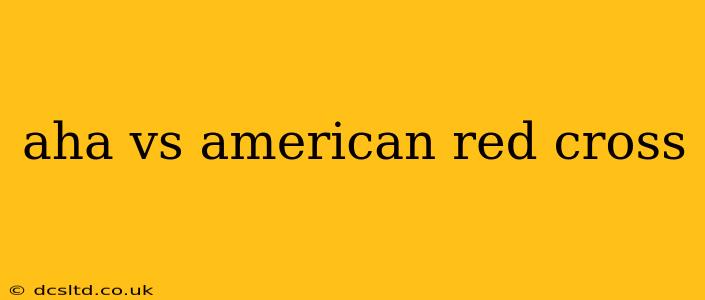Choosing between the American Heart Association (AHA) and the American Red Cross for health and safety training can be confusing. Both organizations are reputable and offer vital courses, but they cater to different needs and have distinct focuses. This detailed comparison will help you understand their differences and choose the right organization for your requirements.
What Does the AHA Do?
The American Heart Association is dedicated to fighting heart disease and stroke. Their training programs, therefore, heavily emphasize cardiovascular emergencies, such as CPR, BLS (Basic Life Support), and ACLS (Advanced Cardiovascular Life Support). They are a leading source of medical research and advocacy, pushing for better heart health nationwide. Their courses are highly regarded within the medical community and are often required for healthcare professionals.
What Does the American Red Cross Do?
The American Red Cross is a broader humanitarian organization. While they offer CPR and First Aid training, their curriculum extends to a wider range of emergency responses, including disaster relief, blood drives, and community safety programs. Their training is more general and accessible to the public, making it a popular choice for individuals and businesses needing basic safety certifications.
AHA vs. American Red Cross: Course Differences
While both organizations offer CPR and First Aid, there are key differences:
CPR/BLS:
-
AHA: Focuses on the science and medical aspects of CPR, often incorporating more advanced techniques and medical terminology. Their courses are more rigorous and detail-oriented. Their BLS course is widely recognized and required in healthcare settings.
-
American Red Cross: Offers a more simplified approach to CPR, focusing on practical skills and easy-to-remember steps. Their courses are designed for a broader audience and emphasize immediate action in emergencies.
First Aid:
-
AHA: Offers First Aid training integrated with CPR, often in a combined course. The focus is aligned with their cardiovascular emphasis, but it covers a general range of injuries and illnesses.
-
American Red Cross: Provides more comprehensive First Aid training covering a wider spectrum of injuries, illnesses, and emergency situations. They often offer specialized courses beyond basic First Aid.
Which Certification is Right for Me?
The best organization for you depends on your needs:
-
Healthcare Professionals: The AHA is generally preferred for healthcare professionals due to the rigor and medical emphasis of their courses. Their certifications are often required or highly recommended in various healthcare settings.
-
General Public/Businesses: The American Red Cross is a good choice for individuals and businesses requiring basic CPR and First Aid certifications for workplace safety or personal preparedness. Their courses are more accessible and easier to understand for the general public.
-
Specific Needs: Consider the specific skills you require. If you need advanced cardiac life support training, the AHA is the clear choice. If you need training related to disaster relief or other humanitarian services, the Red Cross is more appropriate.
Which Organization Offers Better Training?
Both organizations provide high-quality training. The "better" option depends entirely on your specific requirements and goals. The AHA offers more medically focused training ideal for healthcare professionals, while the American Red Cross provides broader, more accessible courses suitable for a wider audience.
Are AHA and Red Cross Certifications Recognized Everywhere?
Both AHA and Red Cross certifications are widely recognized, but acceptance can vary depending on the employer or institution. It's always best to check the specific requirements of your workplace or program before enrolling in a course.
How Much Do AHA and Red Cross Courses Cost?
Course costs vary depending on the location, instructor, and type of course. Both organizations have a range of pricing options. It's best to check their respective websites for current pricing in your area.
In conclusion, both the American Heart Association and the American Red Cross provide valuable training. By understanding their respective focuses and course offerings, you can make an informed decision about which organization best meets your needs.
